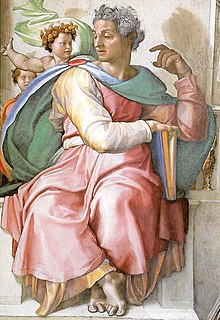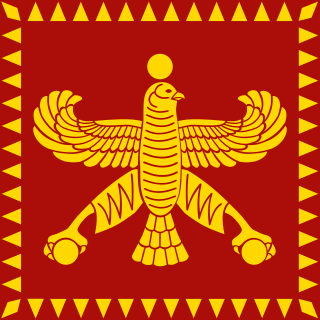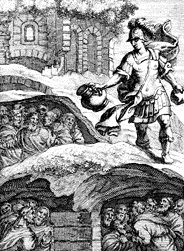Related Research Articles

The Book of Chronicles is a book in the Hebrew Bible, found as two books in the Christian Old Testament. Chronicles is the final book of the Hebrew Bible, concluding the third section of the Jewish Tanakh, the Ketuvim ("Writings"). It contains a genealogy starting with Adam and a history of ancient Judah and Israel up to the Edict of Cyrus in 539 BC.

The Book of Ezra is a book of the Hebrew Bible; which formerly included the Book of Nehemiah in a single book, commonly distinguished in scholarship as Ezra–Nehemiah. The two became separated with the first printed rabbinic bibles of the early 16th century, following late medieval Latin Christian tradition. Composed in Hebrew and Aramaic, its subject is the Return to Zion following the close of the Babylonian captivity, and it is divided into two parts, the first telling the story of the first return of exiles in the first year of Cyrus the Great (538 BC) and the completion and dedication of the new Temple in Jerusalem in the sixth year of Darius I (515 BC), the second telling of the subsequent mission of Ezra to Jerusalem and his struggle to purify the Jews from marriage with non-Jews. Together with the Book of Nehemiah, it represents the final chapter in the historical narrative of the Hebrew Bible.

The Book of Nehemiah in the Hebrew Bible, largely takes the form of a first-person memoir concerning the rebuilding of the walls of Jerusalem after the Babylonian exile by Nehemiah, a Jew who is a high official at the Persian court, and the dedication of the city and its people to God's laws (Torah). Since the 16th century, it has generally been treated as a separate book within the Bible. Before that date, it had been included in the Book of Ezra; but in Latin Christian Biblex from the 13th century onwards, the Vulgate Book of Ezra was divided into two texts, called respectively the First and Second books of Ezra; a separation which became canonised with the first printed bibles in Hebrew and Latin. Mid 16th century Reformed Protestant Bible translations produced in Geneva were the first to introduce the name 'Book of Nehemiah' for the text formerly called the 'Second Book of Ezra'.

Haggai was a Hebrew prophet during the building of the Second Temple in Jerusalem, and one of the twelve minor prophets in the Hebrew Bible and the author of the Book of Haggai. He is known for his prophecy in 520 BCE, commanding the Jews to rebuild the Temple. His name means "my holidays." He was the first of three post-exile prophets from the Neo-Babylonian Exile of the House of Judah, who belonged to the period of Jewish history which began after the return from captivity in Babylon.

Isaiah was the 8th-century BC Israelite prophet after whom the Book of Isaiah is named.

Obadiah is a biblical prophet. The authorship of the Book of Obadiah is traditionally attributed to the prophet Obadiah.

The Israelites were a confederation of Semitic-speaking tribes in the ancient Near East who, during the Iron Age, inhabited a part of Canaan.
Abdi is a male name. It is a given name with many origins in many countries including Arabic. Among others, one version has Arabic as origin, while another is of Biblical origin.

Nehemiah is the central figure of the Book of Nehemiah, which describes his work in rebuilding Jerusalem during the Second Temple period. He was governor of Persian Judea under Artaxerxes I of Persia. The name is pronounced or in English. It is in Hebrew נְחֶמְיָה, Nəḥemyāh, "Yah comforts".
Malchijah is a biblical name belonging to several persons mentioned in the Hebrew Bible and means "Yahweh is King" or "the king is Yahweh".

Ezra–Nehemiah is a book in the Hebrew Bible found in the Ketuvim section, originally with the Hebrew title of Ezra. The book covers the period from the fall of Babylon in 539 BCE to the second half of the 5th century BCE, and tells of the successive missions to Jerusalem of Zerubbabel, Ezra, and Nehemiah, and their efforts to restore the worship of the God of Israel and to create a purified Jewish community.

The return to Zion is an event recorded in Ezra–Nehemiah of the Hebrew Bible in which the Jews of the subjugated Kingdom of Judah were freed from the Babylonian captivity following the conquest of the Neo-Babylonian Empire by the Achaemenid Persian Empire. After their release, the Persian king Cyrus the Great issued a proclamation known as the Edict of Cyrus that enabled the freed Jews to return to Jerusalem and the Land of Israel, which had begun to function as a self-governing Jewish province.

Yehud, also known as Yehud Medinata or Yehud Medinta, was an administrative province of the Achaemenid Persian Empire in the region of Judea that functioned as a self-governing region under its local Jewish population. The province was a part of the Persian satrapy of Eber-Nari, and continued to exist for two centuries until its incorporation into the Hellenistic empires following the conquests of Alexander the Great.
According to the Talmud, there were 48 prophets and 7 prophetesses of Judaism. The last Jewish prophet is believed to have been Malachi. In Jewish tradition it is believed that the period of prophecy, called Nevuah, ended with Haggai, Zechariah, and Malachi at which time the "Shechinah departed from Israel".
Adaiah was the name of eight individuals mentioned in the Hebrew Bible. The name means "Yahweh passes by."
- Adaiah, the father of Queen Jedidah. He was of Boscath, a town in the Kingdom of Judah mentioned in the Hebrew Scriptures. His grandson was king Josiah of Israel.
- An Adaiah mentioned in passing as the ancestor of a Levite named Asaph, in 1 Chronicles 6:41.
- An Adaiah mentioned in 1 Chronicles 8:21 as being the son of a Shimei in a Benjamite genealogy.
- A priest listed in 1 Chronicles 9:12 and Nehemiah 11:12. According to Cheyne and Black, it is possible that this same priest should appear in Nehemiah 12:6 or 7, but has been removed by a scribal error that left the name "Jedaiah" in its place.
- A descendant of Bani, listed in Ezra 10:29.
- Another descendant of Bani, listed in Ezra 10:39.
- An Adaiah, son of Joiarib, listed in Nehemiah 11:5.
- An Adaiah mentioned as being the father of Maaseiah in 2 Chronicles 23:1.

Obadiah is a character in 1 Kings in the Hebrew Bible. He was a majordomo in charge of Ahab's palace. According to 1 Kings 18:4, Obadiah hid a hundred prophets of God in two caves, fifty in each, to protect them from Jezebel, Ahab's wife. Later statements of the prophet Elijah, where he describes himself as the only remaining prophet of Yahweh led biblical theologian Otto Thenius to conclude that eventually they were captured and killed, but George Rawlinson and other commentators argue that Elijah means he is the only active prophet because the others are in hiding.

Nehemiah 11 is the eleventh chapter of the Book of Nehemiah in the Old Testament of the Christian Bible, or the 21st chapter of the book of Ezra-Nehemiah in the Hebrew Bible, which treats the book of Ezra and the book of Nehemiah as one book. Jewish tradition states that Ezra is the author of Ezra-Nehemiah as well as the Book of Chronicles, but modern scholars generally accept that a compiler from the 5th century BCE is the final author of these books. The chapter describes the repopulation of Jerusalem. Judahites (4-6), Benjamites (7-9), priests (10-14), Levites (15-18), gatekeepers (19) and "the rest of Israel" (20-21). Roles in relation to leadership, maintenance and prayer in the Temple are allocated. The people cast lots and 1 of 10 are to volunteer to live in the city whilst the remainder repopulate the surrounding areas.
References
- ↑ New Bible Dictionary, second edition. Tyndale House Publishers, Inc., Wheaton, IL, USA.
- ↑ 1 Kings 18:3ff
- ↑ compilation and translation by Holy Apostles Convent. (1998), The Lives of the Holy Prophets, Buena Vista CO: Holy Apostles Convent, p. 4, ISBN 0-944359-12-4
- ↑ 1 Chronicles 3:21
- ↑ 1 Chronicles 7:3
- ↑ 1 Chronicles 8:38
- ↑ 1 Chronicles 9:16
- ↑ 1 Chronicles 12:9
- ↑ 1 Chronicles 27:19
- ↑ 2 Chronicles 17:7
- ↑ 2 Chronicles 34:12
- ↑ Nehemiah 12:25
- ↑ Ezra 8:9